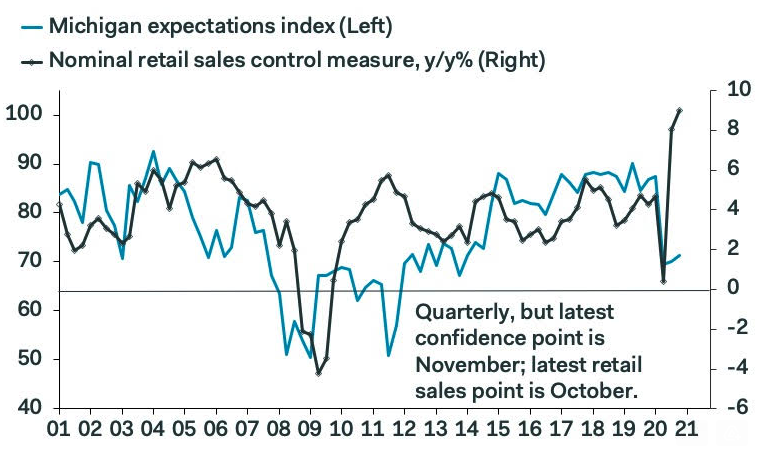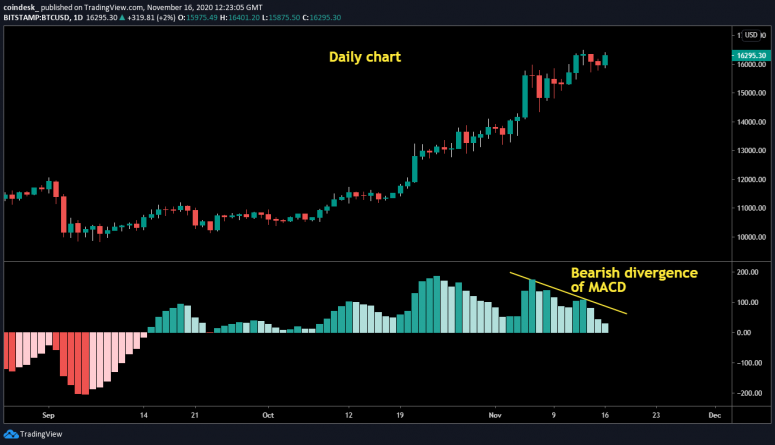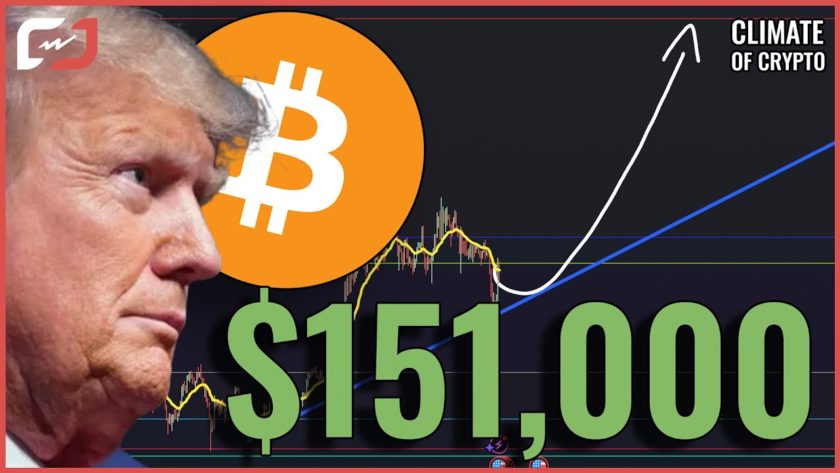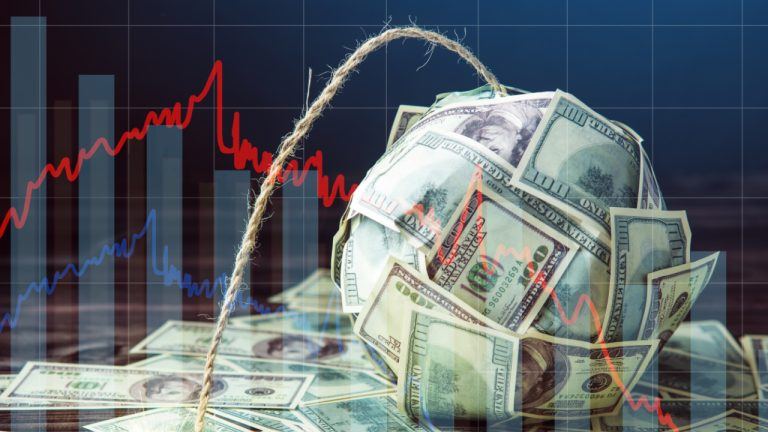Bitcoin was higher, climbing back above $16,000 on Monday after dipping below the mark over the weekend.
“Should we trade back above $16,490, then we expect to see the bulls take the market by the horns and drive prices to a $17,000 handle,” Matt Blom, head of sales and trading at the cryptocurrency financial firm Diginex, told clients in an email. “If we remain capped by $16,490. then we look for another period of consolidation.”
In traditional markets, European and Asian shares rose and U.S. futures pointed to a higher open as a coronavirus vaccine from Moderna was shown to be 95% effective in a preliminary analysis. Gold strengthened 0.2% to $1,892 an ounce.
Market moves
Progress in developing a vaccine may not come soon enough to avoid a third wave of the coronavirus that dents consumer spirits during the crucial holiday shopping season – along with confidence in an economic recovery.
That might mean more pain for retailers, already ailing from the lockdowns earlier this year, while reinforcing the need for new multi-trillion dollar spending packages to provide aid to businesses and households. The dynamic could bolster demand for bitcoin, seen by a growing number of investors in both digital-asset and traditional markets as a hedge against inflation.
“All indications are that a package will still be required to prop the U.S. economy up,” Simon Peters, an analyst for the cryptocurrency-inclusive trading platform eToro. “With bitcoin increasingly cementing its status as an effective inflation hedge and huge amounts of liquidity set to be pumped into Main Street U.S.A., that could be another catalyst to finally take the world’s most popular crypto asset past $17,500.”
Although markets were buoyed last week by news of success in developing a vaccine, broad distribution of the inoculations isn’t expected for several months. Predictions by White House coronavirus adviser Anthony Fauci that cases would tick up with the arrival of winter in the Northern Hemisphere – when people spend more time indoors – appear to be playing out.
According to the Covid Tracking Project, U.S. hospitalizations have surged to a record of about 70,000, with daily deaths now around 1,100, the highest since May.
“With the numbers worsening by day, we expect all measures of consumers’ sentiment to deteriorate over the next couple months, at least,” Pantheon Chief Economist Ian Shepherdson wrote in a report.
A report late last week from the University of Michigan showed U.S. consumer sentiment unexpectedly fell this month to a reading of 77, well below economists’ forecast for an 82.
The decline was driven by falling economic expectations among President Donald Trump’s Republican Party members, following projections that he lost his reelection bid, according to Pantheon.
But the real damper on consumer confidence could come from the resurgence in coronavirus cases around the world. Japan faces mounting pressure to reimpose a state of emergency and South Korea is warning that it’s at a “critical crossroads,” according to Reuters. The U.S. states of Michigan and Wisconsin on Sunday imposed new restrictions on public gatherings, including halting indoor restaurant service, the news service reported.
“Significant and in our opinion under-appreciated economic damage resulting from this latest swell is possible without a meaningful fiscal relief package from Congress,” the brokerage firm Raymond James wrote in a report.
Projected President-elect Joe Biden is expected to speak Monday to outline a strategy for economic recovery. According to Bloomberg News, the plan is expected to rely heavily on a campaign proposal for $2 trillion of government spending, including provisions for clean energy, infrasturcture and jobs stimulus.
“The U.S. economy is heavily reliant on consumer spending, and if surging Covid-19 cases dent confidence significantly going into the holiday season, it could have ramifications for the pace of economic recovery,” eToro’s Peters wrote.

Bitcoin watch

Bitcoin is on the offensive, having rallied for six straight weeks. The cryptocurrency is currently trading above $16,200, having consistently found demand below $16,000 over the weekend.
The long-term bullish case has probably strengthened with the global stockpile of negative-yielding bonds hitting a fresh record high of $17.5 trillion this month. The number has more than doubled in the past eight months.
The sharp rise is the result of deep interest-rate cuts by the U.S. Federal Reserve and other major central banks, as well as massive liquidity-boosting bond purchases to contain the economic fallout from the coronavirus pandemic. Analysts expect the towering stockpile of bonds yielding negative returns to boost demand for inflation-resistant assets such as bitcoin.
“The more central banks print money and push bond yields lower to contend with ongoing stress in the global economy, the more compelling the economics around bitcoin become,” Joel Kruger, strategist at LMAX Digital, told CoinDesk over Telegram.
In the short run, the cryptocurrency may face some selling pressure, as the daily chart indicators are flashing signs of bull fatigue. The MACD histogram, an indicator used to gauge trend strength and trend changes, has charted lower highs, contradicting higher highs on price. Such bearish divergences are often followed by price pullbacks.
The immediate support is seen at $15,715 (weekend low) followed by the psychological level of $15,000. Meanwhile, resistance is seen directly at $20,000.
What’s hot
Bitcoin Cash splits into two new blockchains, again (CoinDesk)
Citi analyst predicts bitcoin could pass $300K by December 2021 (CoinDesk)
Novogratz’s Galaxy Digital makes twin acquisitions in bid to strengthen institutional appeal (CoinDesk)
Bank of England deputy governor says it was not his job “to protect bank business models” from the impact of digital currencies (Reuters)
Fidelity’s crypto arm responds to 6 common bitcoin criticisms (CoinDesk)
Blockchain voting as a solution to democratic election woes are not the solution says MIT in its latest report examining blockchain e-voting (CoinDesk)
Analogs
The latest on the economy and traditional finance
SEC Chair Jay Clayton, who led regulatory pushback against a bitcoin exchange-traded fund, plans to step down at the end of the year (SEC)
U.S. bank-consolidation race is on as Pittsburgh-based PNC agrees to buy U.S. unit of Spain’s BBVA for $11.6 billion (MarketWatch)
Nigerian inflation rate quickens to 14.2% from 13.7% a month ago, due to surging food costs caused by border closures, dollar restrictions and banditry attacks (Bloomberg)
Australia’s stock exchange stopped trade 20 minutes after opening on Monday due to market-data issues; trading expected to resume Tuesday (Reuters)
Korean Air Lines said Monday it would purchase a $1.6 billion stake in ailing and indebted Asiana Airlines, creating world’s 15th largest carrier (Reuters)





